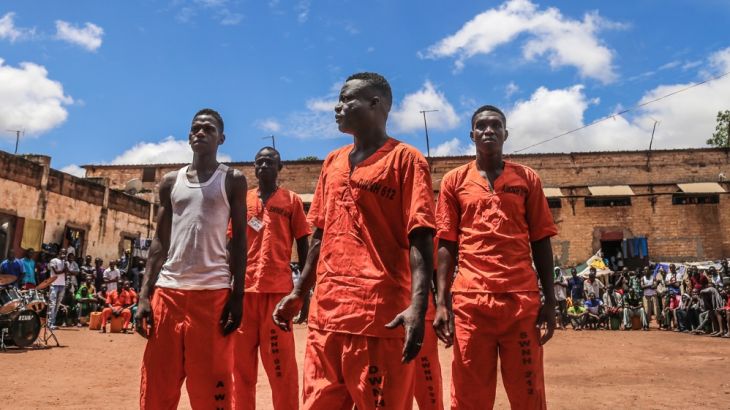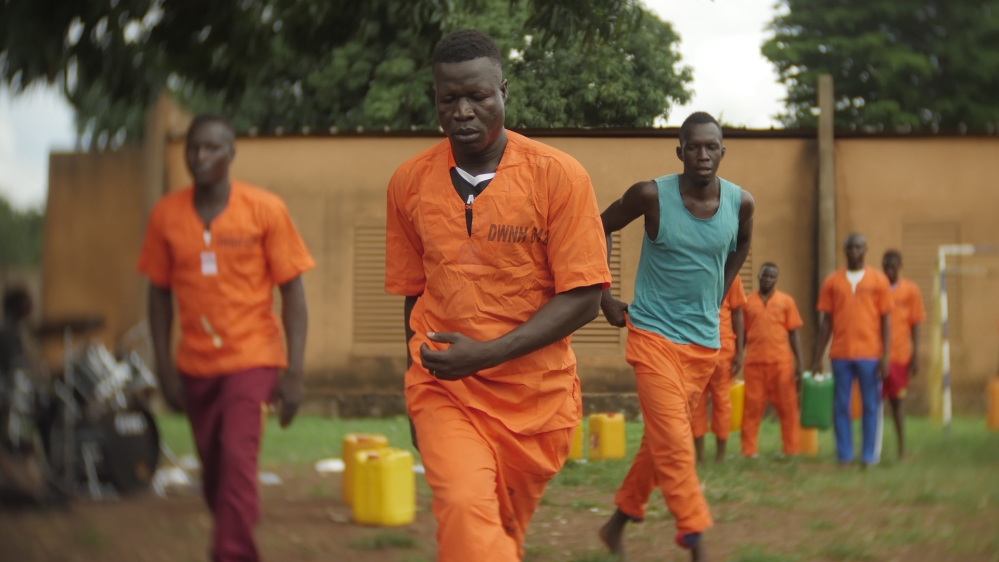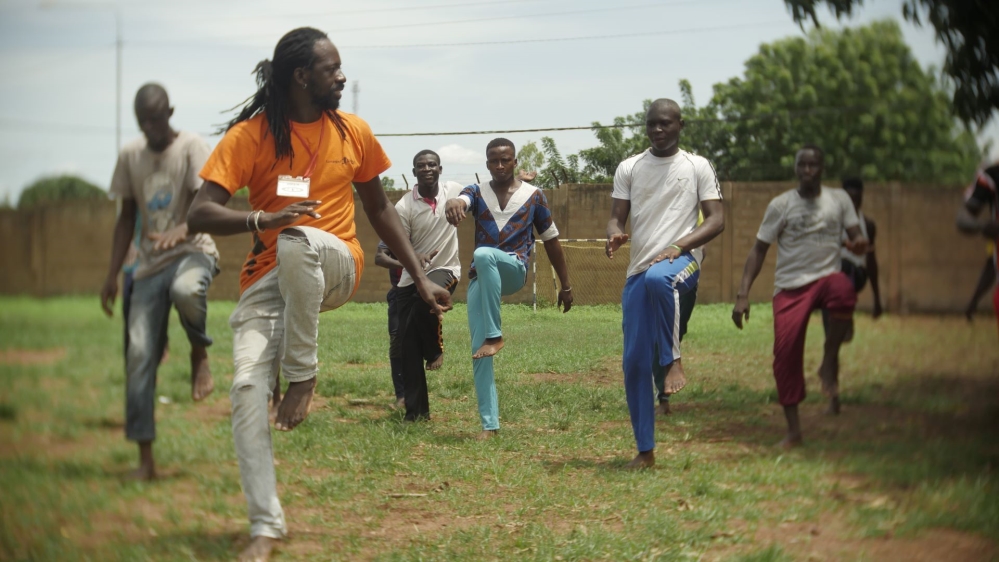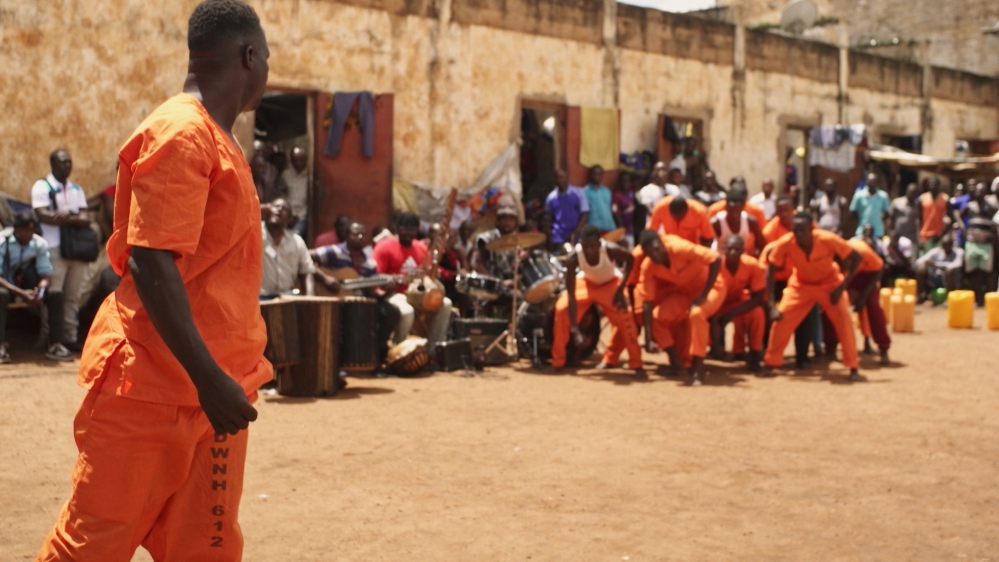
The Dancer Thieves: A Second Chance for Prisoners in Burkina Faso
A world-famous Burkinabe choreographer teaches inmates to dance, preparing his students for life outside prison.
Aguibou Bougobali Sanou is on a mission to share his love of dance with an unexpected group of students – the inmates of Bobo-Dioulasso prison in Burkina Faso.
The Burkinabe choreographer aims to give them something that is in short supply in their overcrowded cells: Hope.
Keep reading
list of 4 itemsInside the pressures facing Quebec’s billion-dollar maple syrup industry
‘Accepted in both [worlds]’: Indonesia’s Chinese Muslims prepare for Eid
Photos: Mexico, US, Canada mesmerised by rare total solar eclipse
“Open up as you dance,” Sanou says to his students as they practise their moves, their shoes piled outside the rehearsal room door. Drummers play in a corner, and the men move in steady rhythm across the room.
“Open up and dance big. Now come back, we are all too close to each other,” he says.
I may be a criminal, but tomorrow I can change with dancing. It allows me to reflect and forget bad memories. Through dance I can become someone.
Sanou hopes that in his classes, he can help his students work through their emotions and reflect on their pasts. He aims to provide them with skills that will stop them from reoffending once they are free citizens.
“I don’t do anything but dance,” he tells his students. “It has given me everything. Now we need to prepare psychologically, mentally and intellectually. So when you leave, you will be prepared no matter what people say.”
But throughout the months of dance practice, Sanou faces his own critics. He hopes to take his students outside the prison walls and perform in public, but those closest to him advise him against it, and prison staff say the inmates cannot be trusted.
He secures the approvals needed to take them out, but in the weeks leading up to their performance, his plans threaten to unravel.
Will the authorities let him take the prisoners outside the prison walls? Can Sanou himself make sure he can trust them? And if they do go, will the world beyond their jail cells respond to these dancing prisoners of Bobo-Dioulasso the way Sanou imagines they would?

FILMMAKERS’ VIEW
By Sam Steele and Lali Houghton
Type Burkina Faso in Google and the impression you get is of a poor landlocked West African country that has fallen victim to the rise of rebel groups. You will read that since 2016, there has been an upsurge of “terrorist” attacks on the capital Ouagadougou. This has led to a growing sense of instability, no longer restricted to the northern and eastern borders with Mali and Niger, over security risks all over the country.
Foreigners are advised to stay away.
But aside from this narrative projected in the headlines, there is another image: One of a rich cultural heritage; famous for the Panafrican Film and Television Festival of Ouagadougou (FeSPACO); for its architecture, music and dance. Most importantly, it is famous for the legacy left by the former president and revolutionary, Thomas Sankara, who inspired grassroots self-reliant development before his assassination in 1987.
This, however, is the story of Aguibou Bougobali Sanou, or as he is more commonly known, Bouba, a dancer who believes in that progressive Burkinabe image and who decided to set that example in the most unlikely of places: The main prison in his hometown Bobo-Dioulasso.
Bobo-Dioulasso is the country’s second-largest city and is host to West Africa‘s second-largest dance festival called In-Out which is organised by Bouba and his performance company Tamadia.
It was through one of the festival’s outreach programmes that an inmate at the prison in Bobo-Dioulasso first witnessed a performance by Bouba. After seeing this, he wrote to him expressing a desire to learn to dance.
In 2017, Bouba created the first prison dance group, funded initially with Taiwanese aid, but now entirely self-funded and kept alive thanks to Bouba’s own international dance workshops and performances around the world.

The impact has been immeasurable not least because the living conditions inside the prison are beyond anyone’s imagination.
With an overcrowded capacity of over 400 percent, some prisoners sleep in bathrooms, while others take shifts on floor space.
Prisoners speak of a stigma of being disowned by their families, or of being stuck in legal limbo for years without ever being formally sentenced. With little to no hope for a better future, one would not expect a successful rehabilitation scheme involving contemporary dance.
And yet through the scheme, a small legion of prisoners have become somewhat disciples to Bouba’s teachings. He puts aside the fact that they have committed serious crimes; from armed robbery, rape to murder; or that some are serving lengthy terms.
The project’s aim is to serve as a therapeutic space, allowing the prisoners to find alternative ways of expressing their past, inspiring them with hope for the future, and possible new career paths. All he requires from them is full commitment and discipline.
Through the film, we learn of Bouba’s desire for the prisoners to perform outside of the prison walls. A risky ambition indeed, but does Bouba’s trust in criminals go beyond naive? Many critics would say so.
The result is a study that should be closely watched by anyone who questions the power of art for its healing properties or who may see prisoners as sub-citizens or lost causes.
Bouba contests that none of those who left the prison has so far reoffended. In the absence of hope and opportunity, the example given by Bouba shows how the marginalised, poor and forgotten can also build towards their own dreams, as long they as they are self-reliant, positive and determined.

It is worth noting again Bouba’s inspiration in Thomas Sankara. Sankara rejected foreign aid, nationalised mineral resources and undertook sweeping land reforms aimed at agricultural self-sufficiency.
Thousands of civilians joined together in a country-building frenzy from railway lines, mass-vaccinations to anti-desertification projects. Sankara described it as “a revolution directed not against any people or any country, but rather one aimed at restoring the dignity of the Burkinabe people; allowing them to achieve happiness as they define it.”
Spiritually, what Bouba wants is to free the souls of the inmates and give them, as the final performance was called, a Second Chance.
So profound was the experience that we as filmmakers were positively affected. These values – whether you are religious or not – should resonate outside of Burkina Faso, elsewhere including the West, wherein an age of discriminatory politics, the downtrodden are often viewed as the problem.
Bouba is a counterweight to the failures of the Burkina Faso government where so often corruption and wasted spending are seen as the root causes for fomenting extremism. And it is that, not so much the sensationalist stories of violence that we should help reverberate globally.